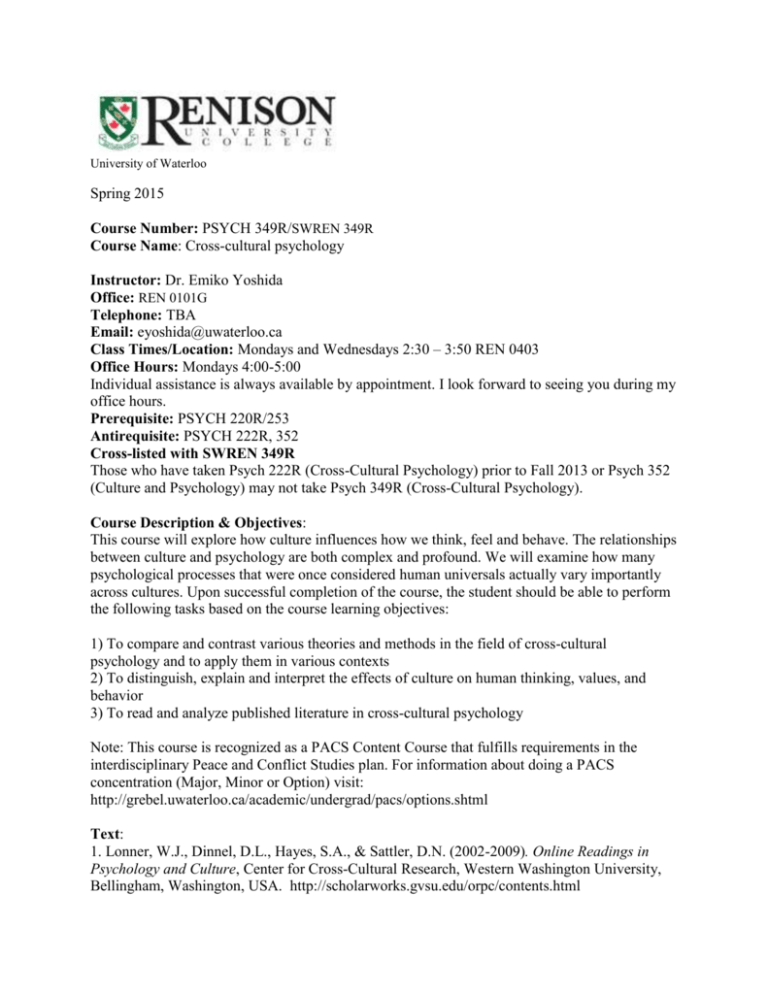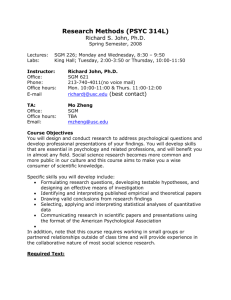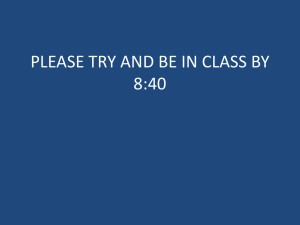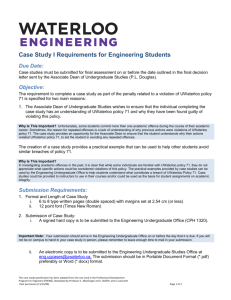psych 349r (pdf) - University of Waterloo
advertisement

University of Waterloo Spring 2015 Course Number: PSYCH 349R/SWREN 349R Course Name: Cross-cultural psychology Instructor: Dr. Emiko Yoshida Office: REN 0101G Telephone: TBA Email: eyoshida@uwaterloo.ca Class Times/Location: Mondays and Wednesdays 2:30 – 3:50 REN 0403 Office Hours: Mondays 4:00-5:00 Individual assistance is always available by appointment. I look forward to seeing you during my office hours. Prerequisite: PSYCH 220R/253 Antirequisite: PSYCH 222R, 352 Cross-listed with SWREN 349R Those who have taken Psych 222R (Cross-Cultural Psychology) prior to Fall 2013 or Psych 352 (Culture and Psychology) may not take Psych 349R (Cross-Cultural Psychology). Course Description & Objectives: This course will explore how culture influences how we think, feel and behave. The relationships between culture and psychology are both complex and profound. We will examine how many psychological processes that were once considered human universals actually vary importantly across cultures. Upon successful completion of the course, the student should be able to perform the following tasks based on the course learning objectives: 1) To compare and contrast various theories and methods in the field of cross-cultural psychology and to apply them in various contexts 2) To distinguish, explain and interpret the effects of culture on human thinking, values, and behavior 3) To read and analyze published literature in cross-cultural psychology Note: This course is recognized as a PACS Content Course that fulfills requirements in the interdisciplinary Peace and Conflict Studies plan. For information about doing a PACS concentration (Major, Minor or Option) visit: http://grebel.uwaterloo.ca/academic/undergrad/pacs/options.shtml Text: 1. Lonner, W.J., Dinnel, D.L., Hayes, S.A., & Sattler, D.N. (2002-2009). Online Readings in Psychology and Culture, Center for Cross-Cultural Research, Western Washington University, Bellingham, Washington, USA. http://scholarworks.gvsu.edu/orpc/contents.html 2. Courseware Reader available at UW bookstore. 3. Journal articles Course Requirements: 1) Tests (2 tests, each worth 20%, total 40%): You will take two midterm tests during the semester. The tests will cover material presented in lectures, including a guest lecture, and the weekly readings. Midterm tests are not cumulative. 2) Final Exam (35%) The final exam will cover all lectures and the textbook after the second midterm. The final exam is not cumulative. 3) Application paper (25%, due on July 15th Wed before class) For this assignment, you will apply theories or concepts in cross-cultural psychology to an example from the media or your experience. You are not allowed to use the same examples that were presented in class or in the readings. Provide enough background information for the example. Submit the paper to the electronic drop box on Learn before class. Please follow the guidelines on this assignment posted on the website (e.g., use of primary sources outside of course material). Late submissions will be dealt on a case by case basis. In cases of severe illness or extreme circumstances, the student must contact the instructor as soon as possible. 4) Bonus mark (1%) In this course, you will have opportunities to earn a bonus mark by participating in anonymous surveys. If you choose to participate in the study, you will be asked to complete two surveys once early in the term (0.5%) and the other at the end of the term (0.5%). Alternatively, you may choose to review articles to earn the mark. You may review up to two primary sources that are outside of the course materials to earn 1% (each review is worth 0.5%). In each review, please include the following elements: 1) The description of the theory and the concept that the authors examined in addition to theoretical background 2) The hypothesis that the authors tested 3) Basic research methodology, such as how the authors operationalized variables, how they tested their hypothesis, procedure of the study 4) Main results including how the authors reached the conclusion 5) Implications of the study such as what impacts the findings may have in our lives Grading: Midterm Test 1 Midterm Test 2 Final Exam Application paper (July 15th Wed before class) Bonus mark 20% 20% 35% 25% 1% Week 1 May 4 (Mon) Topic Overview th May 6th (Wed) Week 2 Understanding and Defining Culture May 11th (Mon) May 13th (Wed) Week 3 Week 4 Week 5 Week 6 May 18th (Mon) May 20th (Wed) Culture and Emotion Courseware (pp. 29 - 44): Heine, S. J. (2008). Emotions th May 25 (Mon) May 27th (Wed) June 1st (Mon) June 3rd (Wed) June 8th (Mon) June 10th (Wed) June 15th (Mon) Week 7 Culture and Health Required readings Recommended article: How to Read a Journal Article in Social Psychology http://arts.uwaterloo.ca/~sspencer/psych253/readart.html 1. Online reading: Unite 2, Subunit 2.2: Triandis, H. C. (2002). Subjective culture 2. Triandis, H.C. & Suh, E. M. (2002). Cultural influences on personality. Annual Review of Psychology, 53(1), 133160. *Read pp. 137-147 3. Gelfand, M. J. (2012). Culture’s constraints: International differences in the strength of social norms. Current directions in psychological science, 21 (6) 420-424. 4. Rosenblatt, A., Greenberg, J., Solomon, S., Pyszczynski, T., & Lyon, D. (1989). Evidence for terror management theory: I. The effects of mortality salience on reactions to those who violate or uphold cultural values. Journal of Personality and Social Psychology, 57(4), 681-690. 1. Courseware (pp. 15 - 28): Shiraev & Levy (2000). Psychological disorders. 2. Ma-Kellams, Blascovich, J., McCall, C. (2012). Culture and the body: East-West differences in visceral perception. Journal of Personality and Social Psychology, 102(4), 718-728. No Class No Class Test # 1 Culture and Human Development Ethnocentrism, Stereotypes and Prejudice Courseware (pp. 1 - 14): Matsumoto & Juang (2013). Enculturation; Culture and developmental processes 1. Online reading: Unit 5, Subunit 5.1: Segall S. H. (2002). Why is there still racism if there is no such thing as “race”? 2. Online reading: Unit 5, Subunit 5.1: Khan, S. R., Benda, T., & Stagnaro, M. N. (2012). Stereotyping from the perspective of perceives and targets 3. Kay, A. C., Day, M. V., Zanna, M. P., & Nussbaum, A. D. (2013). The insidious (and ironic) effects of positive stereotypes. Journal of Experimental Social Psychology, 49(2), 287-291. Week 8 Week 9 June 17th (Wed) June 22nd (Mon) June 24th (Wed) June 29th (Mon) Research Methodology Test # 2 Culture and the workplace Culture and personality Courseware (pp. 45 - 60): Brislin, R. (2000). Culture’s effects on the work world Online reading: Unit 4, Subunit 4.4: McCrae, R. R. (2002). Cross-cultural research on the five-factor model of personality No Class Culture and the Self-Concept Markus, H. R., & Kitayama, S. (1991). Culture and the self: Implications for cognition, emotion, and motivation. Psychological review, 98, 224-253 July 1st (Wed) Week 10 Week 11 Week 12 Week 13 July 6th (Mon) July 8th (Wed) July 13th (Mon) July 15th (Wed) July 20th (Mon) July 22nd (Wed) July 27th (Mon) July 28th (Tue) Online reading: Unit 2, Subunit 2.2: He, J., & van de Vijver, F. (2012). Bias and equivalence in cross-cultural research Culture and Language Culture and Cognition Culture and Interpersonal Relationships Acculturation Online reading: Unite 4, Subunit 4.2: Altarriba, J. (2002). Bilingualism: Language, memory, and applied issues. 2. Online reading: Unite 4, Subunit 4.2: Chiu, C. (2011). Language and Culture. Nisbett, R. E., Peng, K, Choi,& Incheol, N. A. (2001). Culture and systems of thought: Holistic versus analytic cognition. Psychological Review, 108(2 ) 291-310. 1. Anderson, Adams, & Plaut (2008). The cultural grounding of personal relationship: The importance of attractiveness in everyday life. Journal of Personality and Social Psychology, 95(2), 352-368. 2. Iyengar, S. S., Lepper, M. R., & Ross, L. (1999). Independence from whom? Interdependence with whom? Cultural perspectives on ingroups versus outgroups. In D. Miller & D. Prentice (Eds.), Cultural divides: Understanding and overcoming group conflict (pp. 273-301). New York: Sage. http://academiccommons.columbia.edu/catalog/ac:125011 Online reading: Unit 8, Subunit 8.1: Bochner, S. (2003). Culture Shock Due to Contact with Unfamiliar Cultures. Final Examination Policy For spring 2015, the established examination period is August 4-15 2015. The schedule will be available in June. Students should be aware that student travel plans are not acceptable grounds for granting an alternative final examination time (see: http://www.registrar.uwaterloo.ca/exams/finalexams.html). Accommodation for Illness or Unforeseen Circumstances: The instructor follows the practices of the University of Waterloo in accommodating students who have documented reasons for missing quizzes or exams. See http://www.registrar.uwaterloo.ca/students/accom_illness.html Academic Integrity: Academic Integrity: In order to maintain a culture of academic integrity, members of the University of Waterloo are expected to promote honesty, trust, fairness, respect and responsibility. Discipline: A student is expected to know what constitutes academic integrity, to avoid committing academic offences, and to take responsibility for his/her actions. A student who is unsure whether an action constitutes an offence, or who needs help in learning how to avoid offences (e.g., plagiarism, cheating) or about “rules” for group work/collaboration should seek guidance from the course professor, academic advisor, or the Undergraduate Associate Dean. When misconduct has been found to have occurred, disciplinary penalties will be imposed under Policy 71 – Student Discipline. For information on categories of offenses and types of penalties, students should refer to Policy 71 - Student Discipline, http://uwaterloo.ca/secretariat/policiesprocedures-guidelines/policy-71. Grievance: A student who believes that a decision affecting some aspect of his/her university life has been unfair or unreasonable may have grounds for initiating a grievance. Read Policy 70 - Student Petitions and Grievances, Section 4, http://uwaterloo.ca/secretariat/policies-procedures-guidelines/policy-70. In addition, consult http://arts.uwaterloo.ca/student-grievances-faculty-arts-processes for the Faculty of Arts’ grievance processes. Appeals: A student may appeal the finding and/or penalty in a decision made under Policy 70 - Student Petitions and Grievances (other than regarding a petition) or Policy 71 - Student Discipline if a ground for an appeal can be established. Read Policy 72 - Student Appeals, http://uwaterloo.ca/secretariat/policiesprocedures-guidelines/policy-72. Academic Integrity website (Arts): http://arts.uwaterloo.ca/arts/ugrad/academic_responsibility.html Academic Integrity Office (uWaterloo): http://uwaterloo.ca/academic-integrity/ Accommodation for Students with Disabilities: Note for students with disabilities: The AccessAbility Services (AS) Office, located in Needles Hall, Room 1132, collaborates with all academic departments to arrange appropriate accommodations for students with disabilities without compromising the academic integrity of the curriculum. If you require academic accommodations to lessen the impact of your disability, please register with the AS Office at the beginning of each academic term. If you are using Turnitin in your course: Turnitin.com: Plagiarism detection software (Turnitin) will be used to screen assignments in this course. This is being done to verify that use of all material and sources in assignments is documented. In the first week of the term, details will be provided about the arrangements for the use of Turnitin in this course. Note: students must be given a reasonable option if they do not want to have their assignment screened by Turnitin. See http://uwaterloo.ca/academic-integrity/integrity-waterloo-faculty/turnitin-waterloo for more information. Cross-listed course: Please note that a cross-listed course will count in all respective averages no matter under which rubric it has been taken. For example, a PHIL/PSCI cross-list will count in a Philosophy major average, even if the course was taken under the Political Science rubric. A respectful living and learning environment for all 1. It is expected that everyone living, learning or working on the premises of Renison University College will contribute to an environment of tolerance and respect by treating others with sensitivity and civility. 2. Harassment is unwanted attention in the form of jokes, insults, gestures, gossip, or other behaviours that are meant to intimidate. Some instances of harassment are against the law in addition to Renison University College policy. 3. Discrimination is treating people differently because of their race, disability, sex, sexual orientation, ancestry, colour, age, creed, marital status, or other personal characteristics. The Ontario Human Rights Code considers actions and behaviours rather than intentions. 4. If you experience or witness either harassment or discrimination, you may contact the Renison University College Harassment and Discrimination Officer at mmalton@uwaterloo.ca (519-884-4404, ext. 28628).







